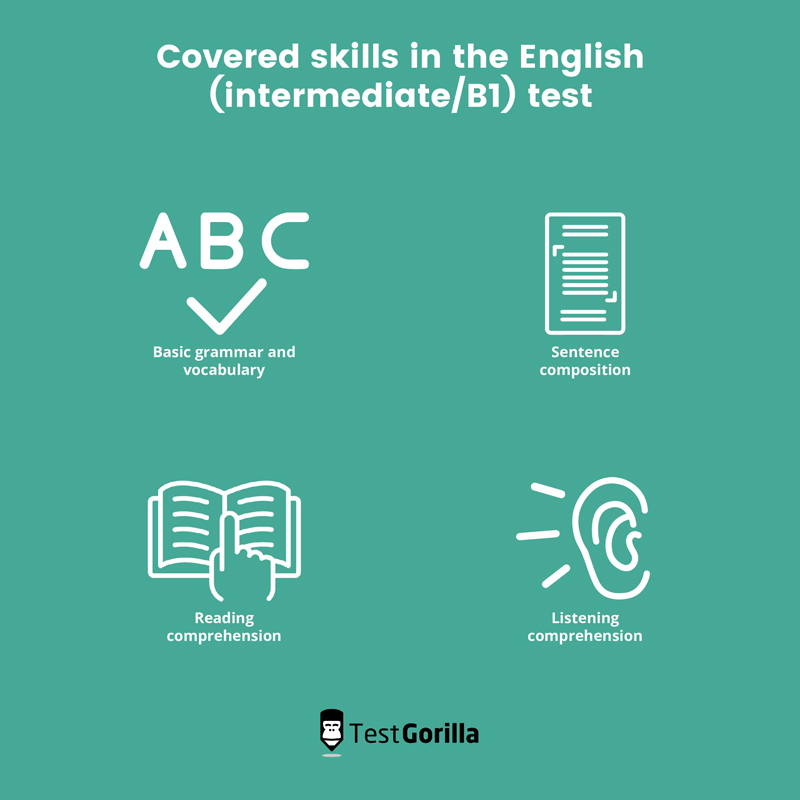Many businesses work on a global scale, so it makes sense to use a common language, or to trade in the native language of the country they are targeting. Not surprisingly, 79% of consumers prefer to buy products from websites written in their own language, and 40% say they will never buy from websites written in other languages.
English is one of the main languages used for business around the world, along with Spanish, Mandarin, and German. Over one billion people around the world speak English as a first or second language, so there is a big demand for English language skills.
However, there are different grades of English fluency. We’re going to look at jobs that require a B1/intermediate English level. We’ll also show you how to use an intermediate English test as part of a pre-employment skills assessment to help you hire faster and with more confidence.
First, though, let’s explore what an intermediate/B1 level of English is.
Table of contents
Intermediate/B1 English
There are different levels of ability to which people can communicate in a specific language.
In order to standardize and align language fluency levels, the Common European Framework of Reference (CEFR) for languages built a simple framework from A1 through to C2, with each level representing improved understanding of and fluency in the language.
The B1 English level means students of the language have more than a basic grasp of speaking and writing in English, but it is intermediate, not advanced. This means that B1 level English speakers may still find it challenging to work or study solely in English.
At the B1 English CEFR level, a student can:
Deal with most situations that may happen while traveling
Produce simple, connected text on subjects which are familiar or of interest to them
Describe experiences, events, dreams, hopes and plans, and also give brief reasons and explanations for these
Those with English B1 level skills can do many jobs that require an intermediate level of English. In the next section we’ll focus on some of the most popular jobs suitable for intermediate English speakers.
Jobs for intermediate/B1 English level speakers
Although those with more advanced-level English skills (B2, C1, and C2) will have more employment options, there are still roles for those with intermediate English skills.
1. Hotel receptionist
Many hotels advertise for receptionists who are able to communicate at a B1/intermediate English level.
The duties of a hotel receptionist include booking guests in and out, dealing with guest queries in person and over the phone, and providing high-quality customer service.
Because it’s a job that requires a lot of contact with guests, receptionists must also be able to communicate well, and possess patience, empathy, respect, and positivity, as well as problem-solving and decision-making skills.
2. Assistant chef/line chef
There are plenty of restaurants willing to hire B1 level English speakers as an assistant chef or line chef.
The job role involves helping with the planning and preparation of various dishes, but other necessary skills include teamwork, problem-solving, and being able to stay calm under pressure.
3. Warehouse picker/packer
Working in a warehouse can be physically demanding, but it also requires a good understanding of written and spoken English.
Warehouse pickers must be able to accurately read labels and safety instructions, locate and pick items from storage, follow warehouse protocols for the labeling and repackaging of items, and correctly document goods that have been moved.
Other crucial skills to succeed in this position include attention to detail, communication skills, and the ability to work as part of a team.
Pro tip: Hiring a great warehouse picker starts with a great job description that will attract top talent. Check out our guide to writing an effective warehouse picker job description.
4. Bar/restaurant staff
Bar and restaurant work is a good way for B1 level English speakers to use and improve their language skills. At B1 level, they have the English skills to successfully take orders and serve customers.
Other skills needed to work in a bar or restaurant include good customer service skills, communication, teamwork, and attention to detail. Being able to stay calm and patient is also an important part of bar work, regardless of language abilities.
5. Retail
Those with a B1 level of English can work and communicate well with customers and other team members alike, so a job in retail can be a good fit for them.
Retail covers a broad area, and jobs for intermediate English speakers could range from shelf-stacking and bag-packing to being a cashier at a register.
Working in retail can be challenging, and also requires other skills, such as patience, empathy, problem-solving, numeracy, and customer service.
How an intermediate English test can help you hire the best candidates
How do you know that your chosen candidates can truly speak English to an intermediate/B1 level until you get to the interviews?
All you have to go on is their CV or their word, and for many job seekers it appears truth about their skills has a tendency to be stretchier than Lycra.
There is a beautifully simple solution to find out if candidates possess the English skills they claim to have. Use a language proficiency test like our English (intermediate/B1) test at the very start of your recruitment process.
By using TestGorilla’s intermediate English test as the first step on the hiring journey, you discover straight away which candidates have English language proficiency.
Our English intermediate B1 test includes a mixture of text-based multiple-choice questions, as well as evaluating the candidates’ understanding of spoken English through an audio clip.
This test is ideal for employers or recruiters looking for candidates who can speak and write simple, everyday business English in the workplace.
All of our skills tests are created by subject-matter experts, and our feedback mechanisms and unique algorithms enable our experts to constantly improve and update their tests.
By including the intermediate English test at the start of the candidates’ application, you have an effective screening tool that will show you which candidates were the top scorers, and which just don’t have the required B1 level of English skills.
However, we don’t recommend using the intermediate English test on its own, but as part of a broader skills-based assessment. We’ll look at why in the next section.
Create a complete skills assessment around the Intermediate English test
If you are looking to employ someone who speaks B1 level English, you may not realize that using the Intermediate English test to find the best candidates is only a part of the process.
Although the B1 test will certainly show you who has the strongest English language skills, it won’t tell you if the candidates have other skills necessary for the role. Those could be soft skills, personality traits, or any other technical skills required to succeed in the job.
The best solution is to create a pre-employment assessment to provide you with a range of data on how well the applicants perform in multiple tests.
TestGorilla assessments consist of up to five separate tests, which the candidates take in one sitting.
If you chose to use the intermediate English test as part of your assessment, you could add up to four other tests.
These could be any combination of our tests, including:
The additional tests you choose from our test library will depend on the type of job you are hiring for. For instance, if you want warehouse staff, you may decide to choose our Attention to Detail (textual) test along with our Warehouse picker test and two more tests to add to the Intermediate English test and create a well-balanced skills assessment.
We have more information on this subject in our post about the test types to include in an assessment for best results.
Take the next step in skills-based hiring with TestGorilla
We know it’s not always a simple task to find the best candidates, but skills-based hiring cuts through the uncertainty of the CV. This enables you to make data-driven, unbiased hiring decisions on a strong foundation of actual job-related skills, not on a list of past jobs and education in an (often inaccurate) resume.
The unpleasant truth about CVs is that one in every three Americans admit to openly lying about their level of skills or qualifications. If caught out, they may say it’s only “bending the truth” or “alternative facts”, but that doesn’t help you get back the time you’ve already wasted on the recruitment process with them.
There are many intermediate-level English speakers looking for employment. By combining our intermediate English test with a wider skills assessment, you are well on your way to finding a great fit for the role you have in mind.
Sign up for your free plan to get started on building your first assessment. If you want more information or to see how our products work first-hand, book a free 30-minute live demo with our sales team, who will be pleased to answer any questions you may have.
Related posts
Hire the best candidates with TestGorilla
Create pre-employment assessments in minutes to screen candidates, save time, and hire the best talent.
Latest posts
The best advice in pre-employment testing, in your inbox.
No spam. Unsubscribe at any time.

Hire the best. No bias. No stress.
Our screening tests identify the best candidates and make your hiring decisions faster, easier, and bias-free.
Free resources
This checklist covers key features you should look for when choosing a skills testing platform
This resource will help you develop an onboarding checklist for new hires.
How to assess your candidates' attention to detail.
Learn how to get human resources certified through HRCI or SHRM.
Learn how you can improve the level of talent at your company.
Learn how CapitalT reduced hiring bias with online skills assessments.
Learn how to make the resume process more efficient and more effective.
Improve your hiring strategy with these 7 critical recruitment metrics.
Learn how Sukhi decreased time spent reviewing resumes by 83%!
Hire more efficiently with these hacks that 99% of recruiters aren't using.
Make a business case for diversity and inclusion initiatives with this data.






















